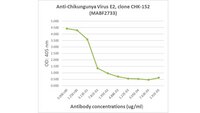MABF2733-100UL Sigma-AldrichAnti-Chikungunya virus E2 Antibody, clone CHK-152
Anti-Chikungunya virus E2, clone CHK-152, Cat. No. MABF2733, is a mouse monoclonal antibody that detects E2 protein in Chikungunya virus (CHIKV) and is tested for use in ELISA, Inhibition, Neutralizing, and Surface plasmon resonance.
More>> Anti-Chikungunya virus E2, clone CHK-152, Cat. No. MABF2733, is a mouse monoclonal antibody that detects E2 protein in Chikungunya virus (CHIKV) and is tested for use in ELISA, Inhibition, Neutralizing, and Surface plasmon resonance. Less<<Produits recommandés
Aperçu
| Replacement Information |
|---|
| References |
|---|
| Product Information | |
|---|---|
| Format | Purified |
| Presentation | Purified mouse monoclonal antibody IgG2a in PBS without azide. |
| Quality Level | MQ200 |
| Physicochemical Information |
|---|
| Dimensions |
|---|
| Materials Information |
|---|
| Toxicological Information |
|---|
| Safety Information according to GHS |
|---|
| Safety Information |
|---|
| Packaging Information | |
|---|---|
| Material Size | 100 µL |
| Transport Information |
|---|
| Supplemental Information |
|---|
| Specifications |
|---|
| Global Trade Item Number | |
|---|---|
| Référence | GTIN |
| MABF2733-100UL | 04065267027746 |
Documentation
Anti-Chikungunya virus E2 Antibody, clone CHK-152 FDS
| Titre |
|---|
Anti-Chikungunya virus E2 Antibody, clone CHK-152 Certificats d'analyse
| Titre | Numéro de lot |
|---|---|
| Anti-Chikungunya virus E2, clone CHK-152 - 4105262 | 4105262 |
| Anti-Chikungunya virus E2, clone CHK-152 - 4105686 | 4105686 |
| Anti-Chikungunya virus E2, clone CHK-152 - 4196112 | 4196112 |
| Anti-Chikungunya virus E2, clone CHK-152 - Q3758867 | Q3758867 |

















